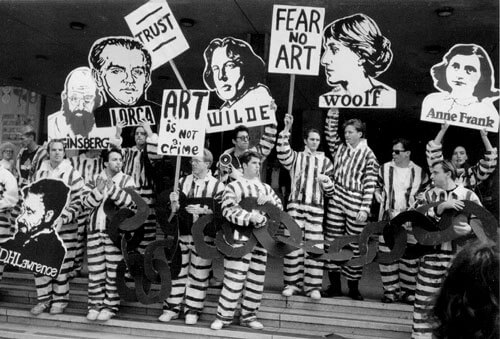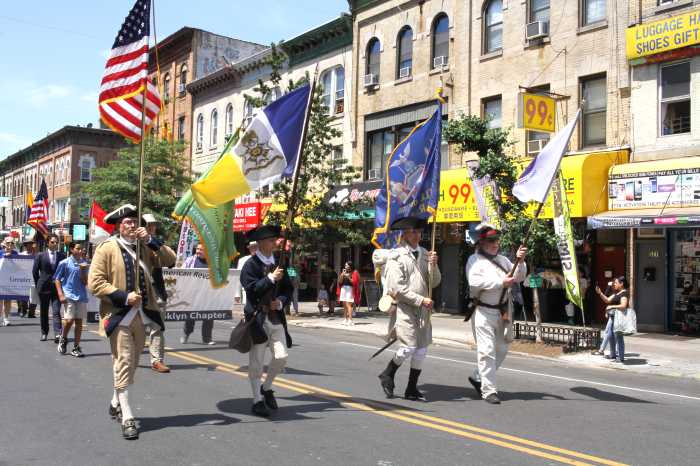Former N.E.A. recipients recall Supreme Court showdown and renounce political meddling
All four were, astonishingly, dressed completely in black, as if in mourning, each and every one of them––black T-shirt, black blouse, black sweater, black dress. Even the moderator, NYU librarian Marvin J. Taylor, was jacketed in black, though the violet shirt radiating from beneath that jacket supplied the stage’s one spot of color.
“Well, here I am on the end,” John Fleck observed from his seat at the far left.
“A pure soul,” he chastely added.
“Bad Girl” Holly Hughes, five seats away, giggled. No, it was not going to be a mourning.
Tim Miller showed up last and late.
“Tim always wanted to have a big entrance,” said Fleck. The two sexual outlaws then spent 30 seconds upstaging one another.
The four stars of the evening had come from far and near––two from California, one from Michigan, one from Nyack––having never before assembled for any length of time in the same room.
“Except at the Supreme Court,” dryly noted Karen Finley, the “chocolate-smeared young woman” of the despicable Evans & Novak column that in May 1990 threw gasoline on incendiary waters––the same Robert Novak, be it said, who 14 years later would put the finger on the CIA wife of a dissenter on the war in Iraq.
These were the NEA 4––the four performance artists who, in that U.S. Supreme Court chamber, on June 15, 1998, heard Justice Sandra Day O’Connor declare, for the majority, that the National Endowment for the Arts had the right to “[take] into consideration general standards of decency and respect for the beliefs and values of the American public” in granting, or not granting, monetary support to individual artists.
“I don’t consider this a happy occasion,” Ms. Finley said early on as the spacious Rosenthal Pavilion of NYU’s Kimmel Center was filling up this past Thursday. “We’ll see how it turns out.”
Caroline Dinshaw, director of NYU’s Center for the Study of Gender and Sexuality, said: “What better time than now?” as she introduced the seven panelists––the “heinous” NEA 4 plus, for salt and pepper, performance artist William Pope L, who had once crawled 22 miles along the Great White Way of Broadway; pungent poet and performance artist Sapphire; and journalist and historian Cynthia Carr, who has covered troublemaking artists for 20 years.
Carr gave a solid rundown of the U.S. cultural wars from the Andres Serrano (“Piss Christ”) and Robert Mapplethorpe electric jolts of the late 1980s and the rescinded N.E.A. grants of 1990 to the Supreme Court decision of 1998. Moderator Taylor, whose library has been archiving the downtown arts scene since 1974, said that in boning up for this evening, “I had found myself getting angry all over again.”
Suddenly Karen Finley spoke up, indeed gave a shout.
“I don’t want to focus on how horrible it was,” she said. “The threats, the audits, the memos on George Bush’s [Bush I] desk. What’s important for me is to try to keep a sense of humor… This was really a collective era. We were icons, and still are icons.
“What saddens me so much,” she continued, “is what the hell are they [prurient powerhouses] doing with all this money and time, when they’re supposed to be dealing with issues of the day.”
Projecting their own sexual problems is, she declared, what they’re doing.
“I’ve decided every political leader has to take Psychology 1.”
Laughter and applause.
“We’re not the enemy,” Finley said, with a gesture that took in the table. “The reason I’m so angry is that progress was being made, on issues of homosexuality, of women, of minorities. There’s been a step on the staircase.”
Cooler now, Finley closed with: “You have to fight. Even if you lose the battle, you win by losing, somehow.”
Tiny, pretty Holly Hughes (aka “the lefty lesbian bully”) spoke up. First off, she wanted everyone to know that the main thing now is “to get rid of George Bush,” and “it’s not enough just to vote. That’s the bare minimum.”
Then, shifting gears, sweetly but grittily: “Karen talking about the pain, the drama, the difficulties puts us back in an unproductive place… opening all the old wounds, the old doubts… just do that on your own time…
“The attacks on the N.E.A. were a template for attacks on public funding of all different sorts… Most painful to me,” said Hughes, “was the failure of any sustained response on the left to stop this.”
Then, mockingly, in the voice of a fair-weather freedom fighter:
“‘Oh, but I have to say, Robert Mapplethorpe disgusts me’”––and then [in her own voice] “the whole discussion goes on about Robert Mapplethorpe. Well, the work [of that whole era] was provocative, it just wasn’t ‘feel good’…It’s very difficult to step up to the plate,” said Hughes, a real slugger. “I use that metaphor as a former waitress.”
John Fleck’s turn.
“What did this all do?” he asked. “It politicized me. Made me realize you have to draw lines. Which side are you on?… This whole fundamental absolutism that’s driving me crazy. Which avenue of expression do you close down?… What wormhole do you close down? This hole? That hole?”
Pause.
“Which is funny, because all my work now is about holes… I grew up, you know, Catholic,” said the Los Angeles rebel. “How can they say I can’t find God in my asshole? Why can’t that be God?”
“I’m sitting differently,” said straight faced Tim Miller who proceeded to recall the ACT UP demonstration in the face of massed Confederate flags and death threats in Chattanooga, Tennessee, where he was, he said, really afraid he was going to be killed.
To Miller, whose partner, Alastair McCartney, is an Australian native struggling to stay in the U.S., gay and lesbian rights––to marry, to have citizenship––are “the ultra issue of our time.”
On the one hand there is the Irish Catholic mayor of San Francisco, Gavin Newsom, “who said ‘Fuck this shit’” and started marrying homosexual couples (“incredibly exciting to me”); on the other is “that incredibly troubled, unstable man in the White House who wants to amend the Constitution.”
As for “that other man” in the White House: “It took 50,000 gay Americans to die before Reagan mentioned the word AIDS,” said Mr. Miller, who added that the whole N.E.A. fight had been well worth it. “Like Karen said, we were shaking the trees.”
During the question period, someone in the audience asked why Bill Clinton, on whose watch much of the Congressional know-nothing assault had transpired, should be let off the hook.
“Because a disappointment is not as important as a disaster,” said Holly Hughes, who chalked up Clinton’s delinquency to “another on the quaint list of his betrayals.”
That wasn’t good enough for Sapphire, the high-intensity poet. “By ending welfare as we know it,” she said, Clinton has doomed millions of black women to poverty and misery. “So fuck him.”
From Karen Finley now came four more words: “I fucked him anyway.”
You could take that just how you chose to take it. Maybe Justice Sandra Day O’Connor could give us an interpretation that conforms with the general standards of decency and diverse beliefs and values of the American public.
We also publish:
Advertising

































